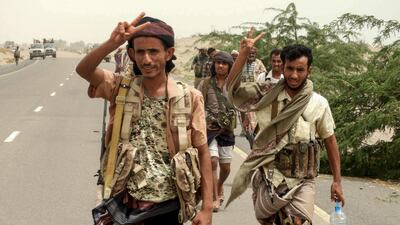Houthi rebels are threatening to blow up the airport terminals of Yemen’s key port city of Hodeidah, said a spokesman with the government forces.
Lt Omar Saleh, spokesman for the Yemeni Army's former elite Al Amalikah brigades — rebuilt with the help of the United Arab Emirates — said two Houthis who had been detained during fighting had admitted that the Iran-backed group was planning to destroy the terminals if government forces pursued their offensive on Hodeidah.
"The two newly-recruited Houthis were arrested on Saturday during clashes near the airport, and they said that mines experts were planting explosives at the terminals," he told The National. "They planted thousands of landmines in the airport."
The Yemeni army said on Saturday that it seized control of the rebel base at Hodeidah's airport, which has been closed since 2014. It added that technical teams were on the scene to de-mine the area.
It was unclear whether the government troops had taken over the entire airport. Later reports said clashes were taking place at the airport’s southern gate but that the army had still not entered the airport.
__________________
Read more
Local fighters in Hodeidah seek to break Houthi yoke
Yemen's Houthi rebels committing war crimes in Hodeidah, human rights minister says
__________________
Lt Saleh said that Houthi fighters were instructed to “to die rather than give up Hodeidah”.
“The two Houthis were told to die if they have to for the sake of Hodeidah because ‘controlling Hodeidah means controlling Sanaa’,” he said.
Lt Saleh also said that the Houthis they detained were forced to fight in Hodeidah.
“When we caught them, they were terrified and expected us to kill them. However, after they realised were treating them nicely, they calmed down and started answering our questions,” he said.
“They told us that the Houthi militia forced them to fight in Hodeidah after threatening them.”
Houthi fighters stormed the residences of men in Sanaa, Amran and Al Mahwit province and told them that they either agree to fight or go to prison, Lt Saleh cited the detainees as saying.
“One of the young men said that his father was arrested by the Houthis and sent to prison because he refused to fight. He was told that they were going to kill him for treason, so the young man offered himself up to fight instead,” said Lt Saleh.
“The Houthis only agreed to release the man’s father, who was extremely sick, after he agreed to fight for them.”
Mohammed Ali Al Shelli, a Yemeni activist, said that he would not put it past the Houthis that they would blow up the terminal or force people into fighting.
"I expect them to do anything if pro-government forces take over the airport because they have no concern for anyone or anything. Wouldn't be the first time they committed a horrible crime," he told The National.
“They have blown up residences of civilians, the only hospital for cancer treatment in Taez and stormed mosques in Hodeidah to turn into halls for fighters.
“They’ve even targeted ambulances. So I expect them to do anything.”
Saudi-owned Al Arabiya reported that the Saudi-led coalition conducted airstrikes on the airport.
Meanwhile, UN special envoy for Yemen Martin Griffiths was holding talks in rebel-controlled Sanaa for a second day on Sunday, as government forces — supported by the Arab coalition — traded mortar fire with rebels near Hodeidah airport.
The coalition, which includes the UAE, intervened in the war in March 2015 at the request of the internationally-recognised government of Yemeni President Abdrabu Mansur Hadi.
A major offensive was launched on Wednesday to liberate Hodeidah from the Houthis, who have been using the port to smuggle in weapons — including ballistic missiles — supplied by Iran and profiting from illegally sold humanitarian aid. Their aim is to box the Houthis into the capital Sanaa, to cut their supply lines and force them to the negotiating table.
Mr Griffith, whose talks have been kept under wraps, was believed to be pressing the Houthis to cede control of the Red Sea port to a UN-supervised committee.
Hodeidah's port handles 80 per cent of essential goods going into Yemen, which the UN says is grappling with the world's worst humanitarian crisis. About 8.4 million people in Yemen face conditions close to famine, according to the World Health Organisation.
The coalition is confident it can capture the port without major disruption to aid supplies.

